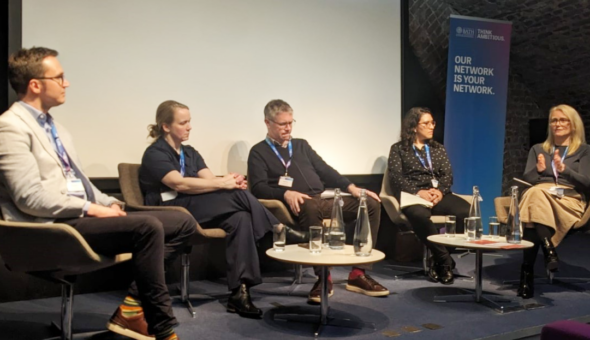To mark Human Rights Day on the tenth of December, we will spend this month exploring business and human rights. The Centre for Business, Organisations and Society will also host the webinar "Business and Human Rights: A scholarly contribution to the ‘decade of action’" where academics will share lessons from their research, revealing how businesses can implement effective human rights practices and policies.
New research from Elisa Giuliani, Annamaria Tuan and Josè Calvimontes explores how effective ‘Creating Shared Value’ projects are at balancing the financial and ethical responsibilities of a business. They emphasise the need to re-conceptualise decision-making in order to give environmental and social priorities equal footing with the economic priorities.
Corporate social responsibility (CSR) policies are fast becoming the norm in all types of firms, in advanced countries as well as low-to-middle income countries. In these latter countries, the influential work of Michael Porter and associates has led to the adoption of many so-called “Creating Shared Value” (CSV) initiatives. These initiatives are based on a ‘win–win’ logic - that firms can prioritise environmental and social challenges while also generating profits and meeting stakeholder expectations. For example, Nestlé was one of the first to introduce CSV projects in its operations, and many other organisations followed suit.
Despite its popularity and widespread adoption, Porter and Kramer’s original work on CSV has been the subject of extensive debate and critique from those questioning the originality of the construct. Scholars have also criticized its ‘win–win’ logic, expressing doubts about whether firms can really transform their business thinking without radically departing from the current corporate mindset.
Inspired by this criticism, we developed our own unique study, looking at cognitive frames. It explores how business actors make sense of CSV projects - this is important because our starting point was that the actions of economic decision-makers are shaped by the ways in which they make sense of something. We also wanted to look specifically at whether these business actors thought this shared value creation related to human rights, or whether it focused primarily on environmental behaviours (that are more likely to generate profit).
To do this we conducted an empirical investigation of small-scale entrepreneurs and other business actors in their local ecosystem, in a low-to-medium income country in Latin America, where CSV projects have gained some traction recently.
What are the dominant cognitive frames?
By interviewing relevant professionals involved in the implementation of CSV, business representatives (entrepreneurs or managers) from the different industry clusters and representatives of a local non-profit organization, we found three distinct cognitive frames:
- Growth first: This was the most prevalent frame, and prioritises economic over social and environmental goals. It says that social, environmental, and human rights benefits trickle down from economic growth and wealth generation.
- Green-win: This frame suggests a clear financial imperative to the win-win logic - meaning that environmental sustainability is pursued only if there are clear and foreseeable economic payoffs.
- Humanising the business: A niche frame that centers certain human rights goals, despite a perceived lack of immediate economic returns. The emphasis was on respect for labour rights, the avoidance of health hazards, and the protection of vulnerable groups.
The profit-focused mindset remains
Our article suggests that most respondents displayed standard, pro-business mental models, even when trained in and motivated to promote CSV projects. The most prevalent model was one that saw the firm’s role as a ‘profit maximiser’ and believed in the existence of ‘trickle down’ economics, meaning that economic growth will inevitably lead to societal wellbeing.
Decision-makers who view the world through this lens are persuaded by the argument that profit-seeking activities will eventually do good to humankind. This logic legitimises the prioritising of financial outcomes, as the expected consequences of this decision will create the environmental or social value.
This suggests also that previous exposure to CSV training had not fundamentally altered the respondents’ profit-maximizing logic. Most entrepreneurs neglected human rights considerations in their sense-making processes, and regarded environmental goals only when conditional on profits.
Most importantly, our work suggests that CSV-like projects are unlikely to take root if the mental models of managers and entrepreneurs continue to be anchored to a growth first frame.
What next?
Our findings emphasise the need for a more explicit connection between CSV and the ‘business and human rights’ agenda. To achieve this aim, decision makers need to adopt a cognitive model that accepts complexity, tensions and ambiguity.
We suggest that genuine gains will not be made by linking CSV projects to human rights unless a new cognitive model (that radically differs from the growth first and the green-win frames) is embedded and normalised. Admittedly, this will be difficult and will take time to achieve, but business schools, MBA courses and related education programs could start the process. This would involve explicit training for managers and other decision-makers to ensure greater respect for human rights in their business conduct. Such training would also provide them with the right conceptual tools to make ‘respect for human rights’ a core component of business decision making.
Respond



